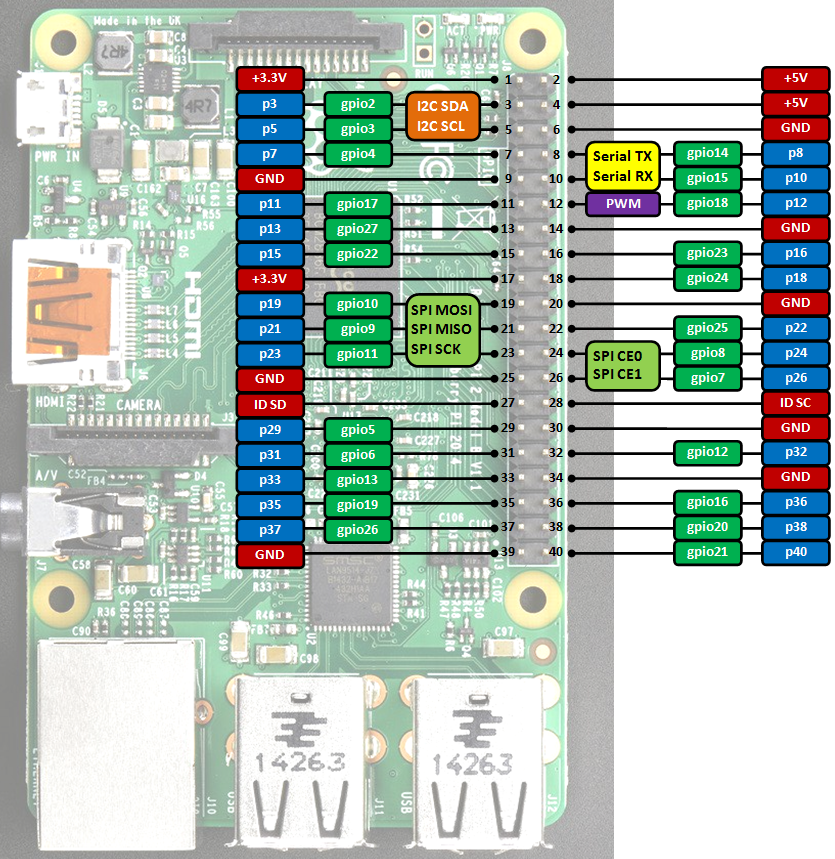mbed API for Raspberry Pi boards.
mbedPi
This is an attempt to implement a limited number of mbed APIs for Raspberry Pi single-board computers. The project was inspired by and based on the arduPi library developed for the Arduino by Cooking Hacks .
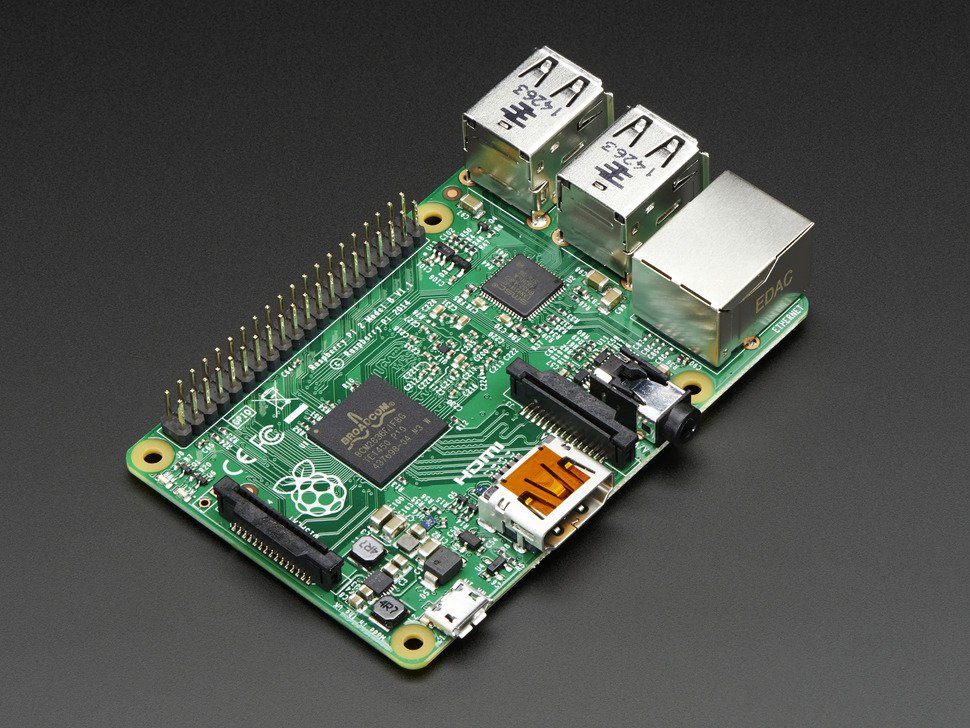
Specifications
- Chip: Broadcom BCM2836 SoC
- Core architecture: Quad-core ARM Cortex-A7
- CPU frequency: 900 MHz
- GPU: Dual Core VideoCore IV® Multimedia Co-Processor
- Memory: 1GB LPDDR2
- Operating System: Boots from Micro SD card, running a version of the Linux operating system
- Power: Micro USB socket 5V, 2A
Connectors
- Ethernet: 10/100 BaseT Ethernet socket
- Video Output: HDMI (rev 1.3 & 1.4)
- Audio Output: 3.5mm jack, HDMI
- USB: 4 x USB 2.0 Connector
- GPIO Connector: 40-pin 2.54 mm (100 mil) expansion header: 2x20 strip providing 27 GPIO pins as well as +3.3 V, +5 V and GND supply lines
- Camera Connector: 15-pin MIPI Camera Serial Interface (CSI-2)
- JTAG: Not populated
- Display Connector: Display Serial Interface (DSI) 15 way flat flex cable connector with two data lanes and a clock lane
- Memory Card Slot: Micro SDIO
GPIO connector pinout
Information
Only the labels printed in blue/white or green/white (i.e. p3, gpio2 ...) must be used in your code. The other labels are given as information (alternate-functions, power pins, ...).
Building programs for the Raspberry Pi with mbedPi
I use Qt Creator for development, however you can use any other IDE available on the Raspberry Pi (e.g. Geany) if you like. For a quick try:
- Install Qt and the Qt Creator onto your Raspberry Pi. Then create a new "Blinky" Plain non-Qt C++ Project as follows:
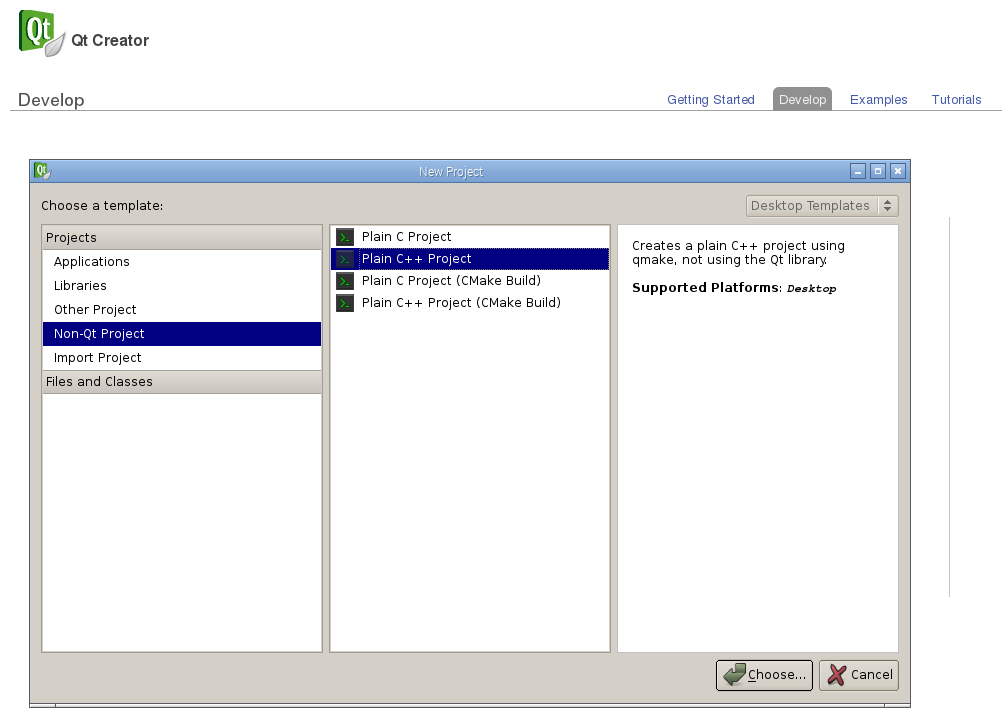
- Change the main code as below:
main.cpp
#include "mbedPi.h"
int main()
{
DigitalOut myled(p7);
while(1) {
myled = 1; // LED is ON
wait(0.2); // 200 ms
myled = 0; // LED is OFF
wait(1.0); // 1 sec
printf("Blink\r\n");
}
}
- Copy the mbedPi.zip file into your project's folder and unzip.
- Add the mbedPi.h and mbedPi.cpp files to your project by right clicking on the "Blinky" project and then clicking on the "Add Existing Files..." option in the local menu:
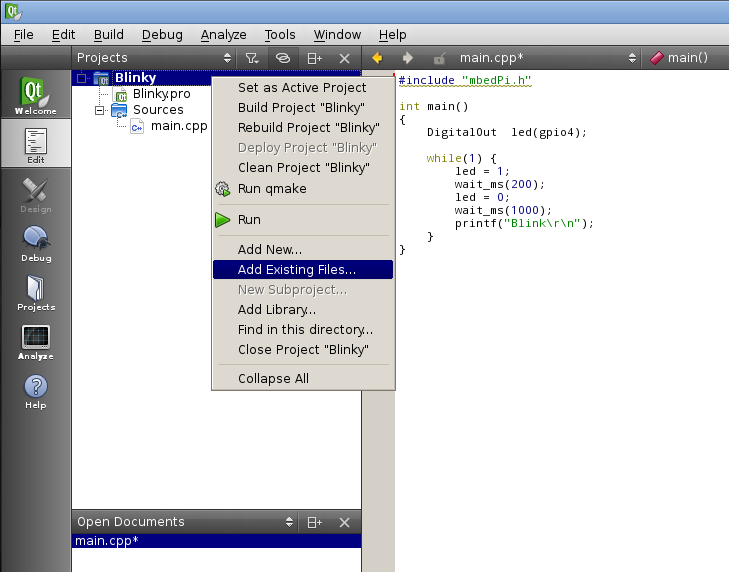
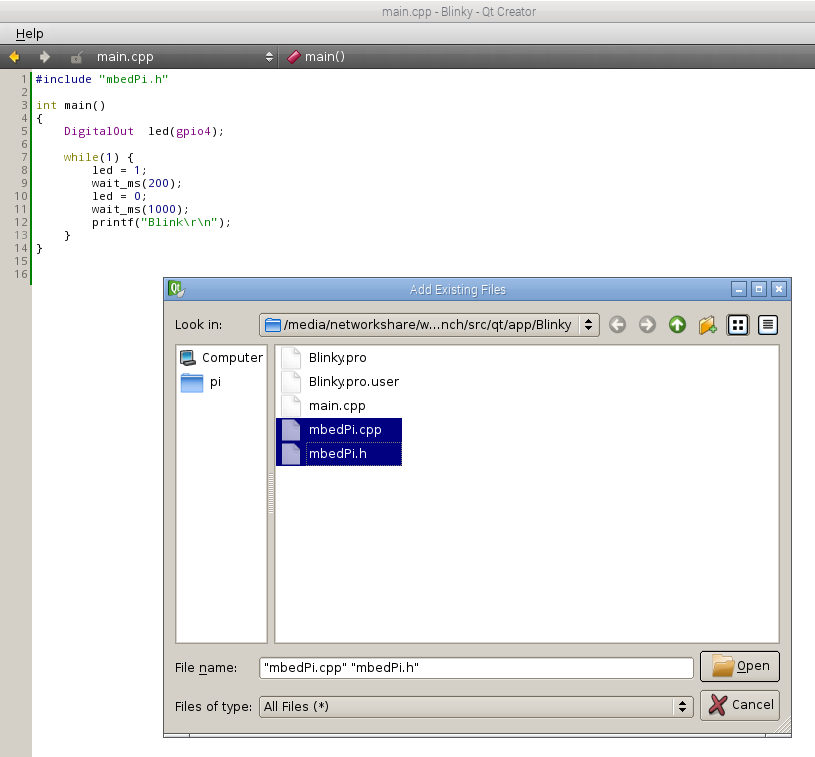
- Double click on Blinky.pro to open it for editing and add new libraries by inserting a new line as follows:
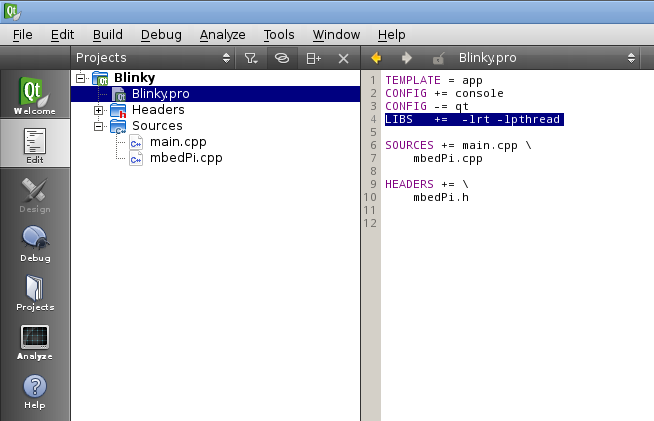
- Compile the project.
- Connect an LED through a 1k resistor to pin 7 and the ground on the Raspberry Pi GPIO connector.
- Run the binary as sudo (sudo ./Blinky) and you should see the LED blinking.

- Press Ctrl+c to stop running the application.
source/I2C.cpp
- Committer:
- hudakz
- Date:
- 18 months ago
- Revision:
- 2:131555dc6fb7
- Parent:
- 1:1f2d9982fa8c
File content as of revision 2:131555dc6fb7:
#include "mbed.h"
extern struct bcm2835_peripheral bsc0;
extern timeval start_program, end_point;
extern volatile uint32_t *bcm2835_bsc1;
I2C::I2C()
{
// start timer
gettimeofday(&start_program, NULL);
//Initiate the Wire library and join the I2C bus.
volatile uint32_t* paddr = bcm2835_bsc1 + BCM2835_BSC_DIV / 4;
// Set the I2C/BSC1 pins to the Alt 0 function to enable I2C access on them
bcm2835_gpio_fsel(SDA, BCM2835_GPIO_FSEL_ALT0);
bcm2835_gpio_fsel(SCL, BCM2835_GPIO_FSEL_ALT0);
// Read the clock divider register
uint16_t cdiv = bcm2835_peri_read(paddr);
// Calculate time for transmitting one byte
// 1000000 = micros seconds in a second
// 9 = Clocks per byte : 8 bits + ACK
_i2c_byte_wait_us = ((float)cdiv / BCM2835_CORE_CLK_HZ) * 1000000 * 9;
}
/**
* @brief
* @note
* @param
* @retval
*/
I2C::~I2C()
{
// Set all the I2C/BSC1 pins back to input
bcm2835_gpio_fsel(SDA, BCM2835_GPIO_FSEL_INPT); // SDA
bcm2835_gpio_fsel(SCL, BCM2835_GPIO_FSEL_INPT); // SCL
}
/**
* @brief
* @note
* @param
* @retval
*/
uint8_t I2C::read(uint8_t address, char* buf, int len, bool repeat)
{
if (repeat) {
_addr = address;
return read_repeat(buf, len);
}
else {
requestFrom(address, len);
return read(buf);
}
}
/**
* @brief
* @note
* @param
* @retval
*/
uint8_t I2C::read(bool ack)
{
char buf[1] = { 0 };
if (ack) {
_i2c_bytes_to_read = 1;
read(buf);
}
else {
read_repeat(buf, 1);
}
return buf[0];
}
/**
* @brief
* @note
* @param
* @retval
*/
int I2C::write(uint8_t address, const char* buf, int len, bool repeat)
{
setAddress(address);
return write(buf, len);
}
/**
* @brief
* @note
* @param
* @retval
*/
int I2C::write(uint8_t data)
{
char i2cdata[1] = { data };
return write(i2cdata, 1);
}
/*******************
* Private methods *
*******************/
/**
* @brief
* @note
* @param
* @retval
*/
void I2C::setAddress(uint8_t address)
{
_addr = address;
volatile uint32_t* paddr = bcm2835_bsc1 + BCM2835_BSC_A / 4;
bcm2835_peri_write(paddr, _addr);
}
/**
* @brief
* @note Used by the master to request bytes from a slave device
* @param
* @retval
*/
void I2C::requestFrom(unsigned char address, int len)
{
setAddress(address);
_i2c_bytes_to_read = len;
}
/**
* @brief Reads bytes from slave after a call to WirePi::requestFrom(address, len)
* @note
* @param
* @retval
*/
uint8_t I2C::read(char* buf)
{
volatile uint32_t* dlen = bcm2835_bsc1 + BCM2835_BSC_DLEN / 4;
volatile uint32_t* fifo = bcm2835_bsc1 + BCM2835_BSC_FIFO / 4;
volatile uint32_t* status = bcm2835_bsc1 + BCM2835_BSC_S / 4;
volatile uint32_t* control = bcm2835_bsc1 + BCM2835_BSC_C / 4;
uint32_t remaining = _i2c_bytes_to_read;
uint32_t i = 0;
uint8_t reason = BCM2835_I2C_REASON_OK;
//
// Clear FIFO
bcm2835_peri_set_bits(control, BCM2835_BSC_C_CLEAR_1, BCM2835_BSC_C_CLEAR_1);
// Clear Status
bcm2835_peri_write_nb(status, BCM2835_BSC_S_CLKT | BCM2835_BSC_S_ERR | BCM2835_BSC_S_DONE);
// Set Data Length
bcm2835_peri_write_nb(dlen, _i2c_bytes_to_read);
// Start read
bcm2835_peri_write_nb(control, BCM2835_BSC_C_I2CEN | BCM2835_BSC_C_ST | BCM2835_BSC_C_READ);
// wait for transfer to complete
while (!(bcm2835_peri_read_nb(status) & BCM2835_BSC_S_DONE)) {
// we must empty the FIFO as it is populated and not use any delay
while (bcm2835_peri_read_nb(status) & BCM2835_BSC_S_RXD) {
// Read from FIFO, no barrier
buf[i] = bcm2835_peri_read_nb(fifo);
i++;
remaining--;
}
}
// transfer has finished - grab any remaining stuff in FIFO
while (remaining && (bcm2835_peri_read_nb(status) & BCM2835_BSC_S_RXD)) {
// Read from FIFO, no barrier
buf[i] = bcm2835_peri_read_nb(fifo);
i++;
remaining--;
}
// Received a NACK
if (bcm2835_peri_read(status) & BCM2835_BSC_S_ERR) {
reason = BCM2835_I2C_REASON_ERROR_NACK;
}
// Received Clock Stretch Timeout
else
if (bcm2835_peri_read(status) & BCM2835_BSC_S_CLKT) {
reason = BCM2835_I2C_REASON_ERROR_CLKT;
}
// Not all data is received
else
if (remaining) {
reason = BCM2835_I2C_REASON_ERROR_DATA;
}
bcm2835_peri_set_bits(control, BCM2835_BSC_S_DONE, BCM2835_BSC_S_DONE);
return reason;
}
/**
* @brief Read len bytes from I2C sending a repeated start after writing the required register.
* @note
* @param
* @retval
*/
uint8_t I2C::read_repeat(char* buf, int len)
{
volatile uint32_t* dlen = bcm2835_bsc1 + BCM2835_BSC_DLEN / 4;
volatile uint32_t* fifo = bcm2835_bsc1 + BCM2835_BSC_FIFO / 4;
volatile uint32_t* status = bcm2835_bsc1 + BCM2835_BSC_S / 4;
volatile uint32_t* control = bcm2835_bsc1 + BCM2835_BSC_C / 4;
uint32_t remaining = len;
uint32_t i = 0;
uint8_t reason = BCM2835_I2C_REASON_OK;
// Clear FIFO
bcm2835_peri_set_bits(control, BCM2835_BSC_C_CLEAR_1, BCM2835_BSC_C_CLEAR_1);
// Clear Status
bcm2835_peri_write_nb(status, BCM2835_BSC_S_CLKT | BCM2835_BSC_S_ERR | BCM2835_BSC_S_DONE);
// Set Data Length
bcm2835_peri_write_nb(dlen, 1);
// Enable device and start transfer
bcm2835_peri_write_nb(control, BCM2835_BSC_C_I2CEN);
bcm2835_peri_write_nb(fifo, (uint32_t) _addr);
bcm2835_peri_write_nb(control, BCM2835_BSC_C_I2CEN | BCM2835_BSC_C_ST);
// poll for transfer has started
while (!(bcm2835_peri_read_nb(status) & BCM2835_BSC_S_TA)) {
// Linux may cause us to miss entire transfer stage
if (bcm2835_peri_read(status) & BCM2835_BSC_S_DONE)
break;
}
// Send a repeated start with read bit set in address
bcm2835_peri_write_nb(dlen, len);
bcm2835_peri_write_nb(control, BCM2835_BSC_C_I2CEN | BCM2835_BSC_C_ST | BCM2835_BSC_C_READ);
// Wait for write to complete and first byte back.
wait_us(_i2c_byte_wait_us * 3);
// wait for transfer to complete
while (!(bcm2835_peri_read_nb(status) & BCM2835_BSC_S_DONE)) {
// we must empty the FIFO as it is populated and not use any delay
while (remaining && bcm2835_peri_read_nb(status) & BCM2835_BSC_S_RXD) {
// Read from FIFO, no barrier
buf[i] = bcm2835_peri_read_nb(fifo);
i++;
remaining--;
}
}
// transfer has finished - grab any remaining stuff in FIFO
while (remaining && (bcm2835_peri_read_nb(status) & BCM2835_BSC_S_RXD)) {
// Read from FIFO, no barrier
buf[i] = bcm2835_peri_read_nb(fifo);
i++;
remaining--;
}
// Received a NACK
if (bcm2835_peri_read(status) & BCM2835_BSC_S_ERR) {
reason = BCM2835_I2C_REASON_ERROR_NACK;
}
// Received Clock Stretch Timeout
else
if (bcm2835_peri_read(status) & BCM2835_BSC_S_CLKT) {
reason = BCM2835_I2C_REASON_ERROR_CLKT;
}
// Not all data is sent
else
if (remaining) {
reason = BCM2835_I2C_REASON_ERROR_DATA;
}
bcm2835_peri_set_bits(control, BCM2835_BSC_S_DONE, BCM2835_BSC_S_DONE);
return reason;
}
/**
* @brief
* @note
* @param
* @retval
*/
int I2C::write(const char* buf, int len)
{
volatile uint32_t* dlen = bcm2835_bsc1 + BCM2835_BSC_DLEN / 4;
volatile uint32_t* fifo = bcm2835_bsc1 + BCM2835_BSC_FIFO / 4;
volatile uint32_t* status = bcm2835_bsc1 + BCM2835_BSC_S / 4;
volatile uint32_t* control = bcm2835_bsc1 + BCM2835_BSC_C / 4;
uint32_t remaining = len;
uint32_t i = 0;
uint8_t reason = BCM2835_I2C_REASON_OK;
// Clear FIFO
bcm2835_peri_set_bits(control, BCM2835_BSC_C_CLEAR_1, BCM2835_BSC_C_CLEAR_1);
// Clear Status
bcm2835_peri_write_nb(status, BCM2835_BSC_S_CLKT | BCM2835_BSC_S_ERR | BCM2835_BSC_S_DONE);
// Set Data Length
bcm2835_peri_write_nb(dlen, len);
// pre populate FIFO with max buffer
while (remaining && (i < BCM2835_BSC_FIFO_SIZE)) {
bcm2835_peri_write_nb(fifo, buf[i]);
i++;
remaining--;
}
// Enable device and start transfer
bcm2835_peri_write_nb(control, BCM2835_BSC_C_I2CEN | BCM2835_BSC_C_ST);
// Transfer is over when BCM2835_BSC_S_DONE
while (!(bcm2835_peri_read_nb(status) & BCM2835_BSC_S_DONE)) {
while (remaining && (bcm2835_peri_read_nb(status) & BCM2835_BSC_S_TXD)) {
// Write to FIFO, no barrier
bcm2835_peri_write_nb(fifo, buf[i]);
i++;
remaining--;
}
}
// Received a NACK
if (bcm2835_peri_read(status) & BCM2835_BSC_S_ERR) {
reason = BCM2835_I2C_REASON_ERROR_NACK;
}
// Received Clock Stretch Timeout
else
if (bcm2835_peri_read(status) & BCM2835_BSC_S_CLKT) {
reason = BCM2835_I2C_REASON_ERROR_CLKT;
}
// Not all data is sent
else
if (remaining) {
reason = BCM2835_I2C_REASON_ERROR_DATA;
}
bcm2835_peri_set_bits(control, BCM2835_BSC_S_DONE, BCM2835_BSC_S_DONE);
return reason;
}
// Exposes the physical address defined in the passed structure using mmap on /dev/mem
int I2C::map_peripheral(struct bcm2835_peripheral* p)
{
// Open /dev/mem
if ((p->mem_fd = open("/dev/mem", O_RDWR | O_SYNC)) < 0) {
printf("Failed to open /dev/mem, try checking permissions.\n");
return -1;
}
p->map = mmap
(
NULL,
BLOCK_SIZE,
PROT_READ | PROT_WRITE,
MAP_SHARED,
p->mem_fd, // File descriptor to physical memory virtual file '/dev/mem'
p->addr_p // Address in physical map that we want this memory block to expose
);
if (p->map == MAP_FAILED) {
perror("mmap");
return -1;
}
p->addr = (volatile unsigned int*)p->map;
return 0;
}
/**
* @brief
* @note
* @param
* @retval
*/
void I2C::unmap_peripheral(struct bcm2835_peripheral* p)
{
munmap(p->map, BLOCK_SIZE);
unistd::close(p->mem_fd);
}
/**
* @brief
* @note
* @param
* @retval
*/
void I2C::wait_i2c_done()
{
//Wait till done, let's use a timeout just in case
int timeout = 50;
while ((!((BSC0_S) & BSC_S_DONE)) && --timeout) {
unistd::usleep(1000);
}
if (timeout == 0)
printf("wait_i2c_done() timeout. Something went wrong.\n");
}
